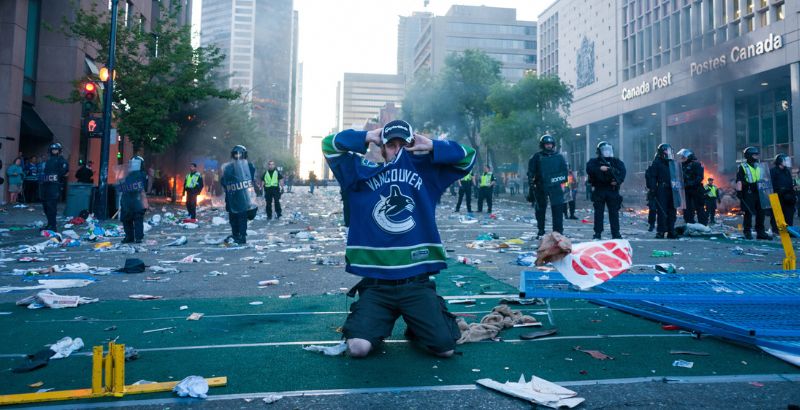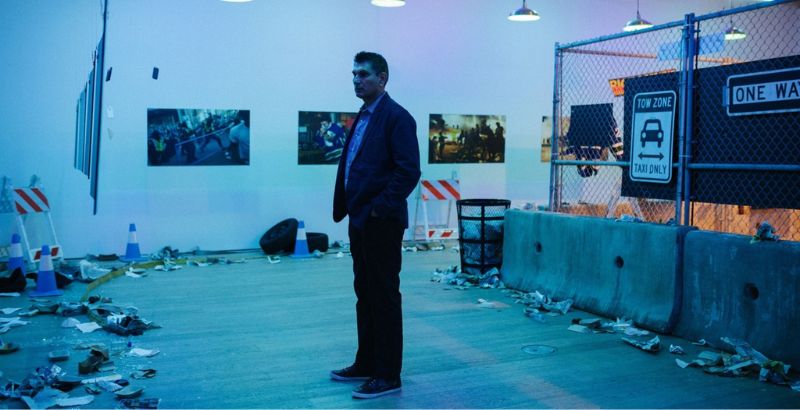
In 2011, when the ice hockey team of the Vancouver Canucks lost the final game of the Stanley Cup final to the Boston Bruins, the city of Vancouver erupted in mind-numbingly dumb violence that included arson, looting, and beatings. Directed by Kathleen Jayme and Asia Youngman, the new ESPN 30 for 30 documentary I’m Just Here for the Riot looks back at this shameful event, but goes one step further as it explores how physical riots evolved into virtual riots with the rise of social media.
After explaining the passion of the city of Vancouver for hockey and the high level of anticipation for what might’ve been the Canucks’ first Stanley Cup win, Jayme and Youngman do a tremendous job of showing you the riot. The shocking footage, the fast-paced editing, and the tense score create a frantic atmosphere that beyond showing how deeply stupid human beings can be, it evokes euphoria. You come out wishing for all these violent people to pay in some sort of way. This sentiment is key for what comes next in the film.
Mosty set up in a traditional and effective talking head format, I’m Just Here for the Riot narrates its story with the aid of interviews with journalists, authors, a police chief, a cameraman, a photographer, an inspector, a Canucks superfan, and a handful of rioters that look back at their shameful acts but also talk about the wave of social media hate that they endured.
Why did these people join in the riots? What did they feel? It’s interesting to hear these answers from the perpetrators, particularly when they all align with a “being swept by it all” sentiment; even better is the testimony of a photographer who describes the sensory overload of the experience and how he too felt the rush to join in. However, this exploration of mob mentality —the moral aspect as well as a scientific explanation— isn’t thoroughly developed as the film moves too quickly in other directions.
We have to remember that this took place in 2011, so there was some naivety around social media use which shows in how rioters happily posed to the many phone cameras around them while committing crimes (then Vancouver chief of Police, Jim Chu, describes it as “the world’s first smartphone riot”). Of course, the aftermath of the violence brought a wave of public shame and hate that soon turned into a virtual witch hunt as irate users took to the web to post thousands of pictures and videos of the rioters to help the police. Thus a virtual mob was born and the rioters were subjected to vicious public shaming which included intimidation, all sorts of name-calling, incessant messages, and death threats.

Social media public shaming is scarily common now, but I’m Just Here for the Riot shows how unprecedented it all felt in 2011, and through the testimonies of those on the receiving end of this hate, it raises moral questions. Did these rioters deserve all that hate? Did their mistakes deserve such a level of vitriol? They committed a crime and paid for it, but what about the “social vigilantes” sending death threats? Shouldn’t they be held responsible for their violent behavior too?
Although this moral aspect is one of the strongest elements of the film, there’s not a thorough exploration of the themes surrounding it. The directors jump between the mob mentality explanation, the stupidity of humanity, the youth immaturity of the rioters, and the toxicity of social media, however, they don’t take a breath and properly provide a meaningful exploration of it all.
Jon Ronson, author of the book So You’ve Been Publicly Shamed talks about how lack of context is key in encouraging harassment in social media, something I’ve seen over and over again being proved true on Twitter, and something that clearly affected one of the subjects, however both the concept and the subject are overlooked. It even feels irresponsible how the film briefly delves into the addiction and mental health problems suffered by the rioters as a consequence of social media abuse, only to drop it all in favor of a weak third-act discourse of “lessons learned along the way” and citizen positivity.
Still, even though it lacks depth, I’m Just Here for the Riot makes for a terrific watch. It’s an engaging and tightly knit study of human stupidity and public shaming that shines a new light on the 2011 Vancouver Stanley Cup riot and showcases how hate can spread even faster, and maybe even more fiercely, through the Internet. It’s far from the definitive film about social media toxicity but a solid testament to its disturbing, merciless nature.
I’m Just Here for the Riot had its world premiere at Hot Docs 2023.
I’m Just Here for the Riot
-
Rating - 7.5/107.5/10
TL;DR
Still, even though it lacks depth, I’m Just Here for the Riot makes for a terrific watch. It’s an engaging and tightly knit study of human stupidity and public shaming that shines a new light on the 2011 Vancouver Stanley Cup riot and showcases how hate can spread even faster, and maybe even more fiercely, through the Internet.






